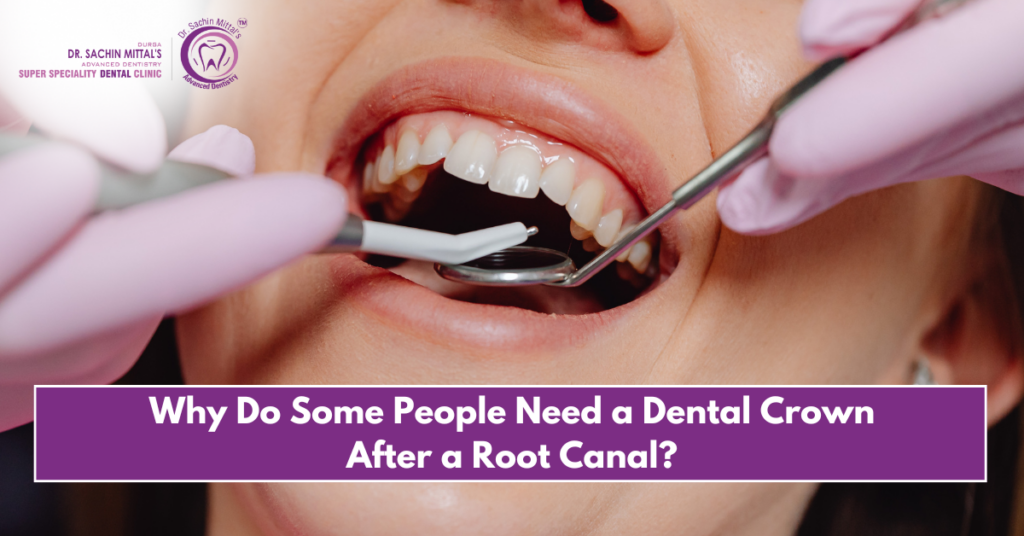A root canal treatment is a procedure designed to save a tooth that has become severely damaged or infected. This procedure eliminates the infected or damaged pulp from inside the tooth, which is vital to its overall health. While root canals are incredibly effective at saving teeth, many patients require a dental crown after the treatment. But why is this necessary? Let’s explore why a dental crown is often recommended following a root canal.
What is a Root Canal?
A root canal is performed to remove the infected or damaged pulp from a tooth. The pulp consists of nerves, blood vessels, and connective tissue, and when it becomes inflamed or infected due to decay, trauma, or deep cracks, it can lead to pain and further complications. A root canal eliminates the infection, cleans out the inside of the tooth, and seals it to prevent further issues.
However, even after a root canal, the tooth’s structure is often weakened. The pulp helps nourish and strengthen the tooth, and without it, the tooth can become brittle and more prone to damage. That’s where a dental crown comes into play.
Reasons for Needing a Dental Crown After a Root Canal
1. Restoration of Tooth Strength
One of the most important reasons for needing a crown after a root canal is to restore the tooth’s strength. The removal of the pulp makes the tooth weaker, and it can easily become brittle. The placement of a dental crown helps reinforce the tooth, making it much more durable and capable of withstanding the forces from chewing and biting.
2. Protection Against Fractures
A tooth that has had a root canal is more likely to fracture or break due to its weakened state. The hollowing out of the tooth to remove the pulp leaves it vulnerable. Even normal chewing and biting can cause the tooth to crack without the added protection of a crown. A crown covers the tooth completely, acting as a shield that prevents it from breaking.
3. Restoration of Function
Another important role of a dental crown is to restore the tooth’s function. After a root canal, the tooth is often reshaped and reduced in size. A crown rebuilds the tooth’s original size and shape, allowing it to function as it did before the treatment. Without a crown, the tooth may feel uneven or weak, making it difficult to use for everyday tasks like chewing.
4. Prevention of Infection
While a root canal eliminates the infection in the pulp, there’s still the potential for future infections if the tooth is left unprotected. A dental crown acts as a barrier, sealing the tooth and protecting it from bacteria that could re-enter. This helps to keep the tooth healthy and free from reinfection, which could otherwise lead to the need for further treatment or extraction.
5. Aesthetic Concerns
For many patients, especially those who have had a root canal on a visible tooth, aesthetics play a major role in the need for a crown. A tooth that has undergone a root canal can become discolored or darker because the pulp, which contributes to the tooth’s color, has been removed. A dental crown, especially one made from porcelain or ceramic, can help restore the tooth’s natural appearance, making it blend seamlessly with the rest of the teeth.
6. Durability and Longevity
A dental crown is designed to be durable and long-lasting. After a root canal, the treated tooth can be susceptible to decay, fractures, and further damage. Crowns are built to withstand the forces of chewing for many years, offering protection for 10 to 15 years or longer when properly cared for. This makes crowns an investment in the tooth’s long-term health.
7. Preventing Tooth Loss
Without a crown, the tooth treated with a root canal could become damaged to the point where it needs to be extracted. If this happens, further restorative procedures like implants or bridges may be required. A crown helps preserve the tooth, avoiding these more complex and expensive treatments.
Types of Dental Crowns
There are several materials available for dental crowns, each with its own advantages:
- Porcelain Crowns: These are commonly used for front teeth because they mimic the natural appearance of teeth and blend in well.
- Ceramic Crowns: Similar to porcelain, these crowns are ideal for patients who want a tooth-like appearance.
- Metal Crowns: Made from materials like gold, metal crowns are very durable, though they are typically used for back teeth, where appearance is less of a concern.
- Porcelain-Fused-to-Metal Crowns: These crowns combine the strength of metal with the aesthetic appeal of porcelain, making them a versatile choice for both front and back teeth.
Why Choose Dr. Sachin Mittal Advanced Dentistry for Your Root Canal and Crown?
At Dr. Sachin Mittal Advanced Dentistry, we prioritize your comfort and long-term oral health. Our expert team specializes in providing comprehensive dental treatments, including root canal therapy and dental crowns, ensuring that you receive the best care possible. Whether you’re in need of a root canal to save a tooth or a crown to restore its function and appearance, we offer state-of-the-art technology and customized care to meet your needs.
Our clinic, located in Hisar, Haryana, is equipped with the latest tools and techniques to ensure that your experience is as smooth and pain-free as possible. We understand that dental procedures can sometimes feel overwhelming, but we are committed to making the process comfortable and efficient for all our patients.
Schedule Your Appointment Today!
Don’t wait until it’s too late to save your tooth! If you’ve recently had a root canal or are considering one, book your consultation with Dr. Sachin Mittal Advanced Dentistry today. Our team will guide you through your treatment options and help you make the best decision for your oral health. Schedule an appointment today and take the first step toward a healthy, beautiful smile!

